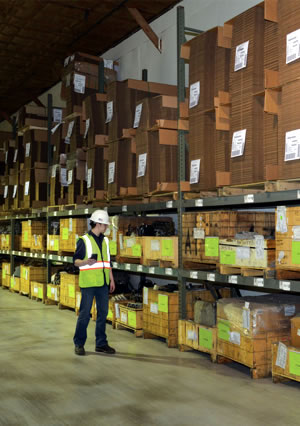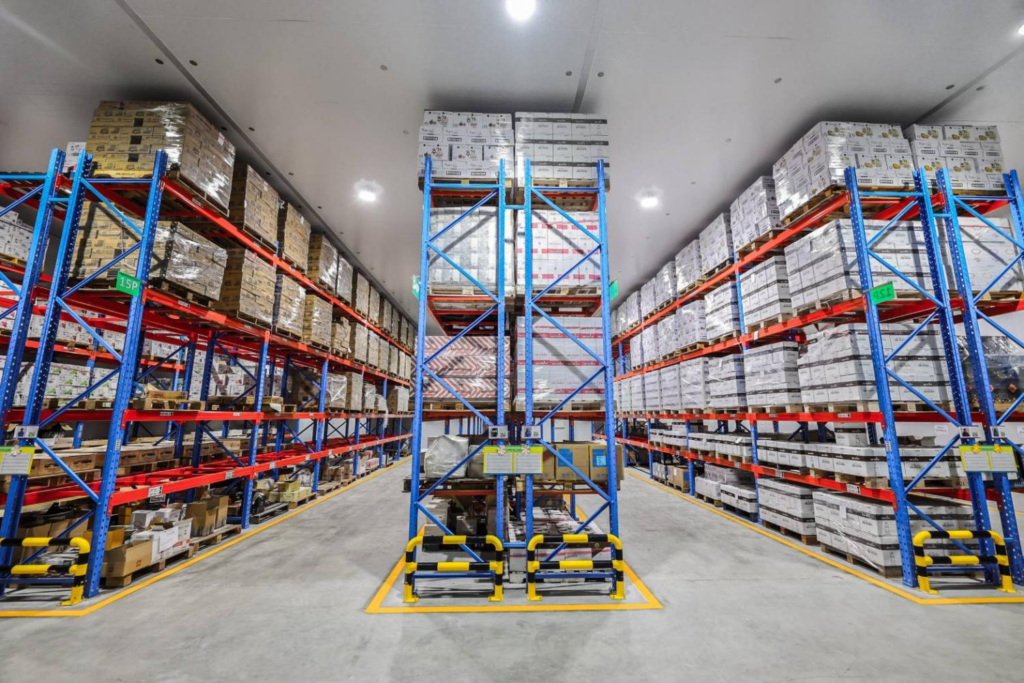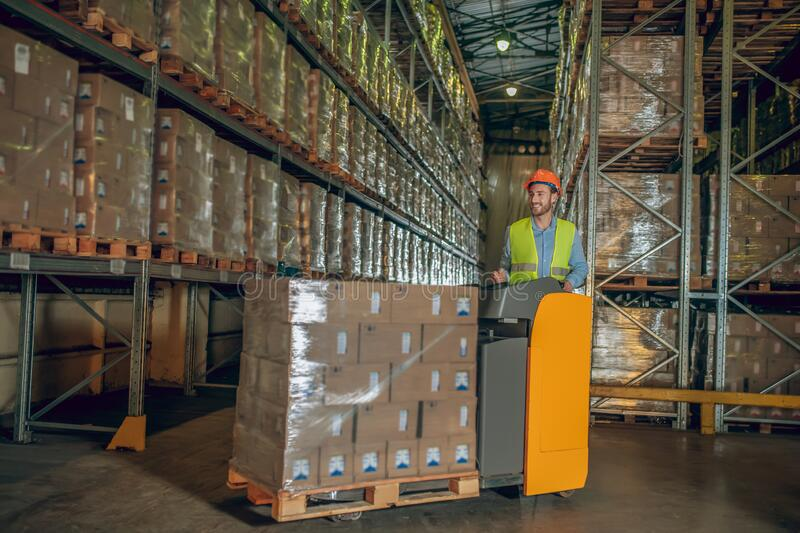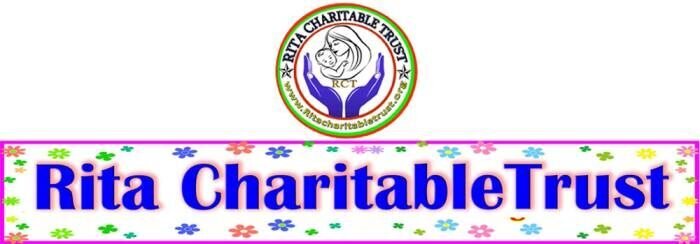Warehouse Binner (1 years diploma )
Warehouse Binner click here
Brief Job Description
Warehouse Binner in the Logistics industry is also known as Binner, Floor Staff, Warehouse Associate.
Individuals in this role need to bin items to put away into storage. Individuals are responsible for binning
items according to an inventory list. Additional responsibilities could at times include moving cargo,
repackaging items and documenting cargo that has been moved. The difference in tasks performed under
the Binner role thus varies according to the volume of operations, however the core function of the role is
to bin items and put away into storage .

Personal Attributes
This job requires the individual to work well with his/her team and achieve joint goals. The individual must
be able to prioritize and execute tasks within scheduled time limits. The individual should be able to
maintain high concentration levels throughout his/her shift.
Minimum Educational Qualification &
Experience
10th Class
OR
8th Class (+ 2 years of ITI)
OR
8th Class (+ 1 year of ITI) with 1 Year of
experience relevant experience
OR
Certificate-NSQF (Loader/ Unloader – level
2) with 1 Year of experience relevant
experience
Minimum Level of Education for Training in
School
Pre-Requisite License or Training Trained in Binning Techniques
Minimum Job Entry Age 18 Years
Last Reviewed On NA
Next Review Date NA
NSQC Approval Date
Version 3.0
Qualification Pack
Description
This OS unit is about preparing for binning inbound packages
Elements and Performance Criteria
Receive all packages in the receiving bay
To be competent, the user/individual on the job must be able to:
PC1. obtain shift schedule and relevant inward documents(inbound lists, inventory log etc.) from
supervisor/team lead
PC2. verify unloaded items against the inward documents and sign off the items as received
PC3. prepare report on quality, schedule variances if any
PC4. obtain binning list once grn has been generated from the data entry operator(DEO)/system
executive

PC5. in case location is not specified in the system, obtain list of items that need to be binned and
locate appropriate/available storage bays for carrying out binning
Check received packages for errors
To be competent, the user/individual on the job must be able to:
PC6. identify if there are any discrepancies such as damaged/misplaced items in the received load
PC7. notify supervisor of any damages for potential fixes /issues
PC8. notify administration/supervisor for any additional orders that need to be placed to replace
misplaced/irreparable damaged items
Pre-pack goods if required
To be competent, the user/individual on the job must be able to:
PC9. identify items that require further/pre-packing
PC10. hand over goods to specialized packer if required
PC11. ensure goods have been packed as required and if preservatives (if required) have been
applied
PC12. label package accordingly with details such as package number, inventory id etc. if required
Safety, Security and Maintenance
To be competent, the user/individual on the job must be able to:
PC13. comply with safety regulations and procedures in case of fire hazards, biohazards, etc.
PC14. wear all safety equipment including protective gear, helmets etc
PC15. follow organization procedures with respect to security, materials handling and accidents
PC16. maintain distance between all on the floor personnel and stay within areas allotted for
warehouse personnel
PC17. park or handover pallet trolleys/carts in case of shift breaks to authorized personnel
PC18. adhere to security regulations of the company
PC19. comply with health and safety regulations and procedures in case of fire, chemical hazards,
bio-hazards, etc.
Knowledge and Understanding (KU)
Qualification Pack
Logistics Skill Council 6
The individual on the job needs to know and understand:
KU1. stock recording systems and procedures
KU2. knowledge of organizational procedures
KU3. role and responsibilities of colleagues on the shop floor
KU4. procedures for dealing with loss or damage to goods
KU5. risk and impact of not following defined procedures/work instructions
KU6. nature and characteristics of goods being binned

KU7. knowledge of all storage areas in the warehouse
KU8. knowledge of client and products handled
KU9. knowledge of all relevant legal, safety and security procedures implications of poor
individual and team performance
KU10. knowledge of types of products
KU11. knowledge of binning methods that can be used for different types of storage situations
KU12. knowledge of scanning products using technology/ equipment available
KU13. types of workplace hazards that one can encounter on the job
KU14. knowledge of stock recording systems
KU15. types of equipment available for binning goods
KU16. knowledge of types of goods being handled or moved
KU17. knowledge of relevant organizational documents including inward documents/ lists, goods
receipt note, binning lists etc.
KU18. the nature and characteristics of goods being handled
Generic Skills (GS)
User/individual on the job needs to know how to:
GS1. fill in appropriate forms and documents
GS2. write/re-write labels in case required
GS3. fill in appropriate forms for inventory received, accidents/damages
GS4. read labels and understand the codes as per company procedures
GS5. read and understand handling instructions/labels such as fragile or heavy
GS6. read and understand company’s safety and operating signs on the shop floor
GS7. read inventory list and task schedule and understand the codes as per company
manuals/operating procedure
GS8. communicate clearly with supervisors and peers
GS9. provide advice and guidance to peers and juniors
GS10. determine items that are damaged/require replacement
GS11. adjust according to volume, capacity and manpower needs during peak and non-peak hours
GS12. prioritize and execute tasks within the scheduled time limits
GS13. suggest methods to improve efficiency of binning process
GS14. identify errors/damages during binning process

GS15. identify solutions for minor issues that delay the binning process
GS16. ability to identify products required to be binned
GS17. ability to assess the products that require further packing
GS18. basic mathematical operations such as addition, subtraction, multiplication and division
GS19. ability to concentrate on task at hand and complete it without errors
GS20. maintain integrity with respect to company property and time
GS21. communicate with people in a form and manner and using language that is open and
respectful
GS22. resolve any difficulties in relationships with colleagues or get help from an appropriate
person, in a way that preserves goodwill and trust
GS23. take responsibility for completing ones own work assignment
GS24. take initiative to enhance/learn skills in ones area of work
GS25. learn from experience in a range of settings and scenarios
GS26. reflect and act upon ones learning
GS27. be open to new ideas and ways of doing things
GS28. develop personal goals in alignment with organization and work towards achieving set
targets
GS29. avoid absenteeism
GS30. act objectively, rather than impulsively or emotionally when faced with difficult/stressful or
emotional situations
GS31. work in a disciplined environment
GS32. be punctual
Elements and Performance Criteria
Preparing for housekeeping activities
To be competent, the user/individual on the job must be able to:
PC1. inspect the area while taking into account various surfaces
PC2. identify the material requirements for cleaning the areas inspected, by considering risk,
time, efficiency and type of stain
PC3. ensure that the cleaning equipment is in proper working condition
PC4. select the suitable alternatives for cleaning the areas in case the appropriate equipment and
materials are not available and inform the appropriate person
PC5. plan the sequence for cleaning the area to avoid re-soiling clean areas and surfaces
PC6. inform the affected people about the cleaning activity
PC7. display the appropriate signage for the work being conducted
PC8. ensure that there is adequate ventilation for the work being carried out
PC9. wear the personal protective equipment required for the cleaning method and materials
being used
Carry out Housekeeping
To be competent, the user/individual on the job must be able to:
PC10. use the correct cleaning method for the work area, type of soiling and surface
PC11. carry out cleaning activity without disturbing others
PC12. deal with accidental damage, if any, caused while carrying out the work
PC13. report to the appropriate person any difficulties in carrying out your work
PC14. identify and report to the appropriate person any additional cleaning required that is outside
ones responsibility or skill

Post housekeeping activities
To be competent, the user/individual on the job must be able to:
PC15. ensure that there is no oily substance on the floor to avoid slippage
PC16. ensure that no scrap material is lying around
PC17. maintain and store housekeeping equipment and supplies
PC18. follow workplace procedures to deal with any accidental damage caused during the cleaning
process
PC19. ensure that, on completion of the work, the area is left clean and dry and meets
requirements
PC20. return the equipment, materials and personal protective equipment that were used to the
right places making sure they are clean, safe and securely stored
PC21. dispose the waste garnered from the activity in an appropriate manner
PC22. dispose of used and un-used solutions according to manufacturers instructions, and clean the
equipment thoroughly
KU1. the levels of hygiene required by workplace and why it is important to maintain them during
your work
KU2. how to inspect a work area to decide what cleaning it needs
KU3. methods and materials that used for cleaning variety of surfaces kb4
KU4. the types of cleansing agents that are not to be mixed together
KU5. the correct method for cleaning equipment and/or machinery used during your work
KU6. the importance of personal protective equipment
KU7. appropriate personal protective equipment for the work area, cleaning equipment, tools,
materials and chemicals used
KU8. the correct sequence for cleaning the work area
KU9. the time taken by the treatment to work
KU10. the importance of following manufacturer’s instructions on cleaning agents
KU11. the most appropriate place to carry out test cleans and why this should be done before
applying treatments
KU12. the importance of applying treatments evenly and the effect of not doing this
KU13. process of cleaning the surfaces without causing injury or damage
KU14. the method to check the treated surface and equipment on completion of cleaning
KU15. procedures for reporting any unidentified soiling
KU16. procedures for disposing off waste
KU17. procedures for disposing off or storing personal protective equipment
KU18. escalation procedures for soils or stains that could not be removed
Generic Skills (GS)
User/individual on the job needs to know how to:
GS1. construct simple sentences and express ideas clearly through written communication
GS2. fill up appropriate technical forms, process charts, activity logs in required format of the
company
GS3. write simple letters, mails, etc
GS4. read and understand manuals, health and safety instructions, memos, reports etc
GS5. read images, graphs, diagrams
GS6. understand the various color codes, as per company nomenclature
GS7. express statements, opinions or information clearly so that others can hear and understand
GS8. participate in and understand the main points of simple discussions
GS9. respond appropriately to any queries
GS10. communicate with supervisor
GS11. handle cleaning equipment
GS12. handle cleaning agents
GS13. handle scrap
GS14. handle chemicals and other material
GS15. select the appropriate cleaning compound for different jobs, sections of the shop floor
GS16. suggest improvements(if any) in process based on experience
Description
This unit is about employability skills, Constitutional values, becoming a professional in the 21st Century,
digital, financial, and legal literacy, diversity and Inclusion, English and communication skills, customer
service, entrepreneurship, and apprenticeship, getting ready for jobs and career development.
Scope
The scope covers the following :
Introduction to Employability Skills
Constitutional values – Citizenship
Becoming a Professional in the 21st Century
Basic English Skills
Communication Skills
Diversity & Inclusion
Financial and Legal Literacy
Essential Digital Skills
Entrepreneurship

Customer Service
Getting ready for Apprenticeship & Jobs
Elements and Performance Criteria
Introduction to Employability Skills
To be competent, the user/individual on the job must be able to:
PC1. understand the significance of employability skills in meeting the job requirements
Constitutional values – Citizenship
To be competent, the user/individual on the job must be able to:
PC2. identify constitutional values, civic rights, duties, personal values and ethics and
environmentally sustainable practices
Becoming a Professional in the 21st Century
To be competent, the user/individual on the job must be able to:
PC3. explain 21st Century Skills such as Self-Awareness, Behavior Skills, Positive attitude, selfmotivation, problem-solving, creative thinking, time management, social and cultural
awareness, emotional awareness, continuous learning mindset etc.
Basic English Skills
To be competent, the user/individual on the job must be able to:
PC4. speak with others using some basic English phrases or sentences
Communication Skills
To be competent, the user/individual on the job must be able to:
PC5. follow good manners while communicating with others
PC6. work with others in a team
Diversity & Inclusion
To be competent, the user/individual on the job must be able to:
PC7. communicate and behave appropriately with all genders and PwD
PC8. report any issues related to sexual harassment
Financial and Legal Literacy
To be competent, the user/individual on the job must be able to:
PC9. use various financial products and services safely and securely
PC10. calculate income, expenses, savings etc.
PC11. approach the concerned authorities for any exploitation as per legal rights and laws
Essential Digital Skills
To be competent, the user/individual on the job must be able to:
PC12. operate digital devices and use its features and applications securely and safely
PC13. use internet and social media platforms securely and safely
Entrepreneurship
To be competent, the user/individual on the job must be able to:
PC14. identify and assess opportunities for potential business
PC15. identify sources for arranging money and associated financial and legal challenges
Customer Service
To be competent, the user/individual on the job must be able to:
PC16. identify different types of customers
PC17. identify customer needs and address them appropriately
PC18. follow appropriate hygiene and grooming standards
Getting ready for apprenticeship & Jobs
To be competent, the user/individual on the job must be able to:
PC19. create a basic biodata
PC20. search for suitable jobs and apply
PC21. identify and register apprenticeship opportunities as per requirement
Knowledge and Understanding (KU)
The individual on the job needs to know and understand:
KU1. need for employability skills
KU2. various constitutional and personal values
KU3. different environmentally sustainable practices and their importance
KU4. Twenty first (21st) century skills and their importance
KU5. how to use basic spoken English language
KU6. Do and dont of effective communication
KU7. inclusivity and its importance
KU8. different types of disabilities and appropriate communication and behavior towards PW
KU9. different types of financial products and services
KU10. how to compute income and expenses
KU11. importance of maintaining safety and security in financial transactions
KU12. different legal rights and laws
KU13. how to operate digital devices and applications safely and securely
KU14. ways to identify business opportunities

KU15. types of customers and their needs
KU16. how to apply for a job and prepare for an interview
KU17. apprenticeship scheme and the process of registering on apprenticeship portal
Generic Skills (GS)
User/individual on the job needs to know how to:
GS1. communicate effectively using appropriate language
GS2. behave politely and appropriately with all
GS3. perform basic calculations
GS4. solve problems effectively
GS5. be careful and attentive at work
GS6. use time effectively
GS7. maintain hygiene and sanitization to avoid infection
Sector
Sector is a conglomeration of different business operations having
similar business and interests. It may also be defined as a distinct
subset of the economy whose components share similar characteristics
and interests.
Sub-sector Sub-sector is derived from a further breakdown based on the
characteristics and interests of its components.
Occupation Occupation is a set of job roles, which perform similar/ related set of
functions in an industry.
Job role Job role defines a unique set of functions that together form a unique
employment opportunity in an organisation.
Occupational
Standards (OS)
OS specify the standards of performance an individual must achieve
when carrying out a function in the workplace, together with the
Knowledge and Understanding (KU) they need to meet that standard
consistently. Occupational Standards are applicable both in the Indian
and global contexts.
Performance Criteria
PC)
Performance Criteria (PC) are statements that together specify the
standard of performance required when carrying out a task.
National
Occupational
Standards (NOS)
NOS are occupational standards which apply uniquely in the Indian
context.
Qualifications Pack
(QP)
QP comprises the set of OS, together with the educational, training and
other criteria required to perform a job role. A QP is assigned a unique
qualifications pack code.
Unit Code Unit code is a unique identifier for an Occupational Standard, which is
denoted by an ‘N’
Unit Title Unit title gives a clear overall statement about what the incumbent
should be able to do.
Description
Description gives a short summary of the unit content. This would be
helpful to anyone searching on a database to verify that this is the
appropriate OS they are looking for.
Scope
Scope is a set of statements specifying the range of variables that an
individual may have to deal with in carrying out the function which have
a critical impact on quality of performance required.
Knowledge and
Understanding (KU)
Knowledge and Understanding (KU) are statements which together
specify the technical, generic, professional and organisational specific
knowledge that an individual needs in order to perform to the required
standard.
Organisational
Context
Organisational context includes the way the organisation is structured
and how it operates, including the extent of operative knowledge
managers have of their relevant areas of responsibility.
Technical Knowledge Technical knowledge is the specific knowledge needed to accomplish
specific designated responsibilities.
Core Skills/ Generic
Skills (GS)
Core skills or Generic Skills (GS) are a group of skills that are the key to
learning and working in today’s world. These skills are typically needed
in any work environment in today’s world. These skills are typically
needed in any work environment. In the context of the OS, these include
communication related skills that are applicable to most job roles.
Electives
Electives are NOS/set of NOS that are identified by the sector as
contributive to specialization in a job role. There may be multiple
electives within a QP for each specialized job role. Trainees must select
at least one elective for the successful completion of a QP with Electives.
Options
Options are NOS/set of NOS that are identified by the sector as
additional skills. There may be multiple options within a QP. It is not
mandatory to select any of the options to complete a QP with Options.








